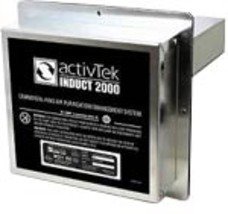What’s that in the air? Is it last night’s corned beef and cabbage — or that new carpet smell?
Sponsored by BerkeysAir Conditioning and Plumbing
What'sbrin your home?
Our homes contain all kinds of chemicals andbrnatural materials that do more than just give off a temporary smell. Modernbrhouses are built air-tight to be more energy efficient using modern buildingbrmaterials, sealants and insulation. brHowever, this increased energy efficiency also increases the chemicalsbrin our homes. Synthetic materials, plastic, glues, sealants, personal productsbrsuch as colognes, deodorants, aromatic candles and air fresheners and justbrabout anything else that produces a scent can contribute to diminishing airbrquality in your house. Let's not forget cleaning products that contain ammonia,brbleach and other chemicals that will add to the mix. Aside from these, therebrare other pollutants that can be present in your home. These usually occur inbrhomes that are older or have pets and include mold and mildew, pet dander,brairborne bacteria, dust and mites and combustion pollutants caused by faultybrheating and air-conditioning equipment.
This “chemical soup” can make our indoor airbrfar more polluted that our outdoor air — even in a big, smoggy city. Pollutantbrlevels can be as high as five times greater indoors than outdoors, which canbrpose significant health risks, not just a few sniffles. Some pollutants, like radon, are naturally-occurringbrgases released from the ground. But as they collect in homes, we breathe inbrthis gas, which can cause long-term health issues such as lung cancer. Otherbrpollutants leach from the building materials we used in construction, such asbrformaldehyde.
Let'sbrClean Up!
The most effective way to improve indoor airbris to eliminate sources of pollutants or reduce their emissions. This can bebrachieved through proper ventilation, changing your A/C filters regularly and maintainingbra clean home.
Some pollutants are created by our dailybrliving habits. Spot ventilation is far more effective to exhaust these directlybrat the source than trying to remove them after they are distributed throughoutbrthe household air. The most common areasbrare kitchens and bathrooms — both produce large amounts of water vapor, whichbris not a pollutant in itself but a contributor to other problems such as mold andbrmildew. Moisture in the air can significantly increase formaldehyde emissionsbrfrom building materials and can lead to mold and mildew growth. An effectivebrrange hood also removes atomized grease. Spot ventilation is also important forbrhobby areas that can produce high concentrations of chemical fumes. Homebroffices with high-capacity laser printers or photocopiers can also generate abrhigh level of pollutants.
Whole-house ventilation is designed to circulatebrfresh air to all habitable spaces, particularly bedrooms and main living areas,brand to flush out low levels of pollutants. Occupants and pets produce moisture,brcarbon dioxide and odors. Whole-house ventilation is not meant to take thebrplace of spot ventilation, but it can effectively remove allergens like pollenbrand dust.
To ensure your ventilation systems are clean,bra licensedbrHVAC technician canbrperform a complete duct cleaning and also install a UV filter in your HVACbrsystem to eliminate pollutants that a filter otherwise will not catch.
Dust mites, mold and mildew love moisture. Keepingbrthe humidity in your home around 30–50 percent helps keep them and otherbrallergens under control. Here are some tips on how to keep the humidity in yourbrhome under control:
· A dehumidifier (and air conditioner duringbrsummer months) helps reduce moisture in indoor air and effectively controlsbrallergens.
· To increase the benefit of a dehumidifier,bruse an exhaust fan when cooking, running the dishwasher or bathing.
· Don't overwater houseplants — neither you norbryour plants want to waste the water.
· Vent the clothes dryer to the outside, notbrthe garage.
· Find and repair leaky plumbing to preventbrmoisture-loving mold and creepy crawlies in your house.
· Empty drip pans in your air conditioner and dehumidifierbrto prevent mold, overflows and leaks.
Airbr“Fresheners”?
Synthetic fragrances in laundry products andbrair fresheners emit dozens of different chemicals into the air. You won't findbrtheir names on the product labels, and the spring fresh scent doesn't mean yourbrlaundry is any cleaner. A plug-in air freshener was found to emit 20 differentbrvolatile organic compounds (VOCs), including seven regulated as toxic orbrhazardous under U.S. federal laws. But these chemicals were not included on thebrlabel. Only the word "fragrance" is required to be listed because thebractual composition of the fragrance is considered a "trade secret."
Most fragrances are derived from petroleumbrproducts. Safety tests usually focus on whether a fragrance causes skinbrirritation, not problems they might cause when inhaled. Improve air quality bybrlooking for fragrance-free or naturally-scented laundry products, using mildbrcleaners that don't include artificial fragrances and refraining from usingbraerosol sprays found in deodorants, hair sprays, carpet cleaners, furniturebrpolish and air fresheners.
Let in the great outdoors! Open windows sobrtoxic chemicals don't build up in your home. Or if outdoor allergens are abrproblem, use your air conditioner and change the filters regularly. Use sliced lemons and baking soda to clean thebrkitchen and leave a fresh scent. Also, bring in green and leafy plants, which arebrliving air purifiers. The foliage and roots absorb chemical pollutants, andbrthey are inexpensive decorations. If you have kids or pets, make sure thebrplants aren't poisonous if ingested and don't produce pollen that might triggerbrallergies.
For additional tips, ask your certified air-conditioningbrtechnician, or see the Department of Energy, Energy.Gov, or visit or call Berkeys to get an expert opinion on how to keep yourbrair quality at its best.
AboutbrBerkeys
Berkeys is an award-winning home-servicebrcompany, providing quality plumbing, air conditioning and heating services tobrhomeowners in the Dallas-Fort Worth Metroplex for more than 35 years.
All of our technicians, arebrbackground-checked, drug-tested, have passed rigorous state examinations andbrare licensed by the State of Texas. They understand the complexity of statebrcodes all the way down to local requirements.
Berkeys maintains an A+ rating with thebrBetter Business Bureau (BBB) and has led the field in area newspapers' readers'brfavorite polls.
For more information about Berkeys, visit www.berkeys.com or call 877-BERKEYS.
